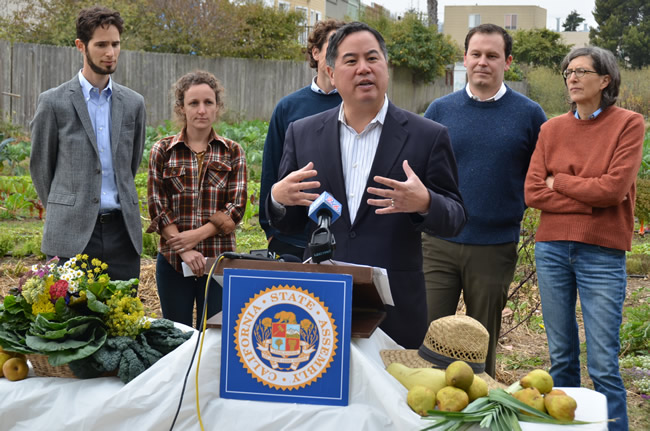
San Francisco, CA – Urban farmers from around the Bay Area showcased their produce at a community garden to celebrate the recent enactment of a state law authored by Assemblymember Philip Y. Ting (D-San Francisco) that will fuel the expansion of urban agriculture through enabling local governments to provide a new tax incentive to the owners of idle land plots.
“Urban farms and gardens started as people wanted to access to organic and healthy food in their neighborhoods,” said Ting. “The success we have seen in San Francisco has spurred growth all around the Bay Area and state. This new program hopes to catalyze this growth and encourage every community to grow their own food.”
With the support of groups like the San Francisco Urban Agricultural Alliance and community farmers across California, Ting authored Assembly Bill 551 that was recently enacted to create the new law. Receiving strong bipartisan support, the program allows cities and counties in urban areas with a population of 250,000 or more to assess land based on agricultural land values rather than highest and best use. After local authorities first create urban agricultural zones, property owners will be able to sign a contract committing their properties to agricultural use for at least 5 years.
Ting’s program is entirely voluntary. Cities and counties can elect to participate through local zoning and landowners of properties 3 acres or less can enter into contracts with their local governments to create urban farms in exchange for reduced property taxes. This framework is based on California’s historic Williamson Act, which enables local governments to enter into contracts with private landowners who restrict the use of their land to agricultural or related open space. In return, landowners receive lower property tax assessments because they are based on this restricted use instead of full market value. However, urban counties – like San Francisco – have no land protected under the Williamson Act because of an inability to meet the minimum 100 acre lot size requirement.
"This groundbreaking legislation gives cities and counties a great new tool that supports urban agriculture projects by helping them access land and have greater land security,” said Eli Zigas, Food Systems and Urban Agriculture Program Manager at SPUR – the San Francisco Planning and Urban Research Association. “I hope that San Francisco will be one of the first places to take advantage of the bill."
A study by the nonprofit group Policy Link found that every dollar invested in urban agriculture returns $6 worth of food to the community. Another study covering a 20-year period in New York City determined that community gardens fueled a growth in the value of neighboring properties, generating over $500 million in associated tax revenue.
Further information about AB 551 is available at www.leginfo.ca.gov.
CONTACT: Anthony Matthews, tel. (916) 319-2019, cell (202) 297-3830, anthony.matthews@asm.ca.gov